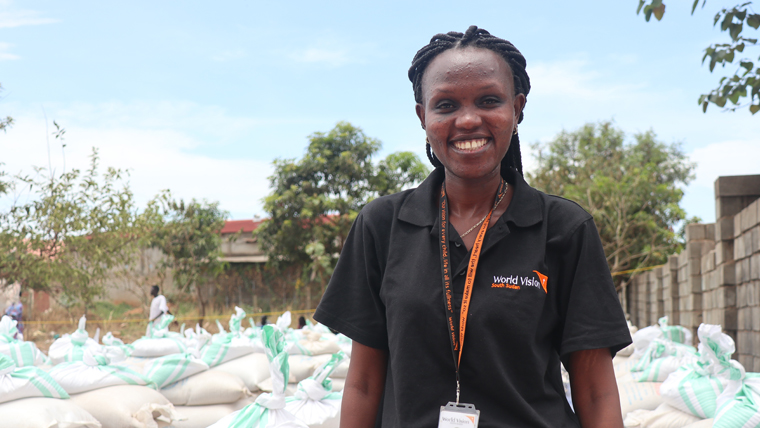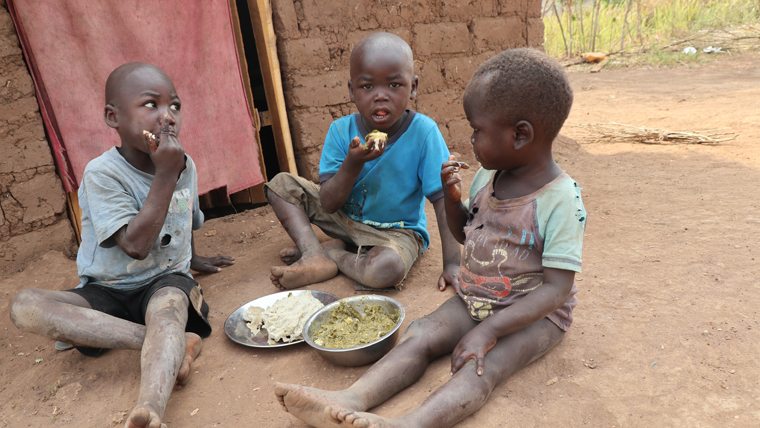
Coronavirus in South Sudan
Fragile life under pressure
What is it like helping vulnerable families, in one of the most fragile places in the world, in the pandemic?
Families forced to flee their homes by conflict and instability in places like South Sudan face a deadly new threat: Covid-19. Our teams are on the ground to protect the world’s most vulnerable people.
Emilienne Cyuzuzo, World Vision’s Food and Cash programme manager in South Sudan, explains:
“It is terrible to see and feel the fears of mothers as the COVID-19 pandemic slowly impacts communities in South Sudan. The reality is beginning to sink in.
Growing up in Rwanda, I have lived the challenges their children face growing up in a fragile state. My family survived on charity and humanitarian support until the country stabilised.
There was one humanitarian worker who inspired me a lot at a young age. She would come and read stories to us, and her enthusiasm to listen to the children was endless.
One day she took me to her office, sat me down and told me that one day when I grow up, I will be like her, doing the work she was doing in different countries. I was just seven years old then.
These experiences fuelled my passion to help the most vulnerable, especially the children. Since 2011 I’ve served in my own country, in Burundi, Uganda and now, South Sudan. I am always ready.”

Social distancing in a crowded camp?
“Many of the women I meet and talk to are among the most vulnerable. They live in the Protection of Civilians (POC) camps in crowded tents, sharing wash rooms and toilets with at least 50 or more households.
The congestion in these camps makes it practically impossible to apply the social distancing and isolation measures recommended by the World Health Organisation (WHO) to prevent the spread of the virus.”
“There are limited hygiene facilities and the healthcare system is weak. Everyone’s prayer is that the pandemic does not spread, especially in these areas – or many will lose lives.”
A lifesaving team under pressure
“I came from Rwanda and have been a humanitarian worker since 2011. I am a registered public health professional with extensive experience in nutrition, food security, livelihoods and cash-based interventions, both in emergency and development programming.
I manage a team overseeing food distribution for thousands of displaced people in Juba, South Sudan. The pandemic has changed the way we work. We have had to revise our response methodology, we’ve put some activities on hold, and we’ve started to include preventive measures in all our activities.
This new normal has put my team under enormous pressure. We are exposed to tremendous health risks as we meet and interact with thousands of people to fulfil our mission. But food assistance is a lifesaving activity. The crisis means we need to do our job faster, while implementing additional processes to keep everyone safe.”

“The need is huge”
“We’ve added information sessions to make people aware of the risks COVID-19 brings and what they need to do to physically distance. But this isn’t an easy task, as people are reasonably most concerned about getting their supply of food and often are resistant to staying at the distribution site longer than necessary.
The need for humanitarian assistance in South Sudan is huge. It pains me every time I see families dividing the food rations we distribute to make ends meet and find means for their other basic supplies. This often leads to inadequate food and rampant malnutrition among children.”
DEC charities can save lives by supporting frontline workers and protecting the vulnerable
The DEC’s 14 member charities, including World Vision, are already present and working in refugee and displacement camps, despite the many challenges presented by the pandemic.
But cases of the virus have already been detected in many of these camps, and they urgently need more funds to scale up their operations and save lives.
- £30 could provide six displaced families with enough soap for a month, to keep themselves clean and safe
- £50 could provide essential hygiene kits to two displaced families
- £100 could provide PPE for one frontline health worker for four months
